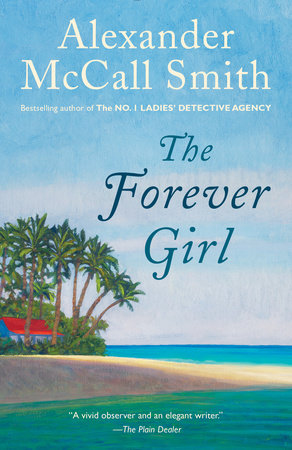The Forever Girl Reader’s Guide
By Alexander McCall Smith


1. The opening of The Forever Girl is different from those of other Alexander McCall Smith novels in that the narrator uses the first person and addresses the reader directly. What is the author hoping to accomplish with this approach?
2. Compare this novel about love to McCall Smith’s previous novel centering on the importance of love in our lives, Trains and Lovers. Further, how do the characters of Mma Ramotswe (from the No. 1 Ladies’ Detective Agency) or Isabel Dalhousie (from the Isabel Dalhousie series) view love?
3. “Expatriates led their detached, privileged lives, knowing that their hosts merely tolerated them, never loved them or accepted them,” says the narrator (p. 23). And George Collins asks: “After all, what colour are the people living in the large houses and what color are the people who look after their gardens? What color are the maids? What does that tell us?” (pp. 39–40). Describe the tension between the hosts and the expats. What is the author saying about expatriate life through the course of the novel? Compare the relationship between the hosts and expats in Grand Cayman, Scotland, and Australia.
4. How would you answer Amanda’s question in talking about race relations in the Caymans: “How long do people have to say sorry?” (p.39).
5. Why does Amanda not tell her husband about her innocent drinks with George? Is she flirting with adultery without actually committing it? Or by withholding information and lying, is she committing adultery of a sort?
6. Discuss the effect upon you as a reader as you encounter the parallel lives of the parents, Amanda and George, and their children, Clover and James. How are the children’s lives similar to those of their parents and how are they different?
7. Why has Amanda fallen out of love with David? And why, in the beginning of the novel, does she stay with him even though she claims to have fallen out of love with him? Do her reasons for staying together change over the course of the novel? What are David’s reasons for remaining with his wife? What about George? Discuss the similarities/differences.
8. Do you agree with the simile George uses to describe falling in love with someone: “It’s like discovering the map that you’ve been looking for all your life and have never been able to find—the map that makes sense of the journey” (p. 166)?
9. Discuss John’s predicament. How is he misunderstood and judged? Why?
10. What are the ethical dilemmas with which the adults in this novel are confronted? Do you agree or disagree with how the various characters deal with the issues of betrayal?
11. Clover grows up feeling like an outsider, like the Caribbean is her temporary home and real life will start when she leaves. Her father’s country, Scotland, with its hills and soft colors (contrasting with the bright colors of the Caymans) “was a world that she had been brought up to believe was where she belonged” (p. 86). Have you ever felt the place where you live or once lived does not match with your personality?
12. When you visit a city, do you think about the architecture and what that architecture says about the place? Clover reflects on Scotland upon arrival: “The overall impression was one of nineteenth-century confidence and solidity” (p. 192). How do you think the architecture of Scotland differs from that of the Cayman Islands, and then later, as we follow Clover, from that of Australia and Singapore?
13. What is the importance of art, especially David Hockney’s art, and colors in this novel? And what about the art of storytelling?
14. What do you think of the advice that Clover receives from her mother to marry “somebody who’s kind” (p. 91)? What would be the characteristic you would advise someone to look for in a potential spouse? Can you imagine what the advice would be coming from any other Alexander McCall Smith characters?
15. Do you agree with Amanda’s comment that Clover is “in love with an idea of a boy, rather than with an actual boy” (p.158)? Why do you think Clover is so taken with James?
16. Amanda on Margaret: “Do you think people actually want their lives? Or do you think they just accept them?” (p. 12). Discuss how what Amanda says may reflect the way she feels about her own life. How do you think the author answer this question? How would you?
17. Do you agree with Clover’s comments on our personas? “Most of us have a persona we project to the outside world—it’s the part of us they see. And then there’s the bit behind that, which is the bit that remains with us when we turn the lights out” (p. 267).
18. “Could you make do with kindness rather than love? What if you were to lead a life in which you were never given the love that you craved, but found friendship and the kindness and consideration that went with that?” (p. 276). Discuss how the novel’s main characters—from Amanda to James to John—would answer those questions. How would you respond if Clover were speaking with you?
19. Do you agree with the statement that “we all want love, friendship, happiness to last forever, to be as it was before” (p. 93)? How does this assertion relate to the novel? What is The Forever Girl saying about love and the persistence of love?
Just for joining you’ll get personalized recommendations on your dashboard daily and features only for members.
Find Out More Join Now Sign In